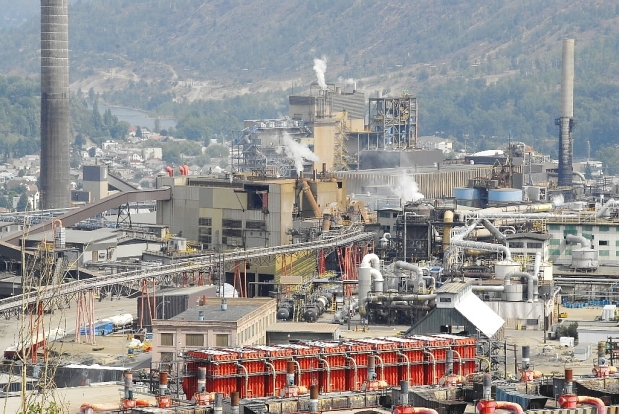forum
library
tutorial
contact

Teck Resources Admits Polluting Columbia River in U.S.
by Gordon HoekstraVancouver Sun, September 11, 2012
|
the film forum library tutorial contact |

|
Teck Resources Admits Polluting Columbia River in U.S.by Gordon HoekstraVancouver Sun, September 11, 2012 |
 Teck Resources has admitted that mining waste and effluent from its Trail smelter polluted the Columbia River across the U.S.-Canada border in Washington State for 100 years.
Teck Resources has admitted that mining waste and effluent from its Trail smelter polluted the Columbia River across the U.S.-Canada border in Washington State for 100 years.
Its subsidiary, Teck Metals Ltd., agreed to these facts as part of a civil lawsuit with U.S. plaintiffs, which include American first nations and the State of Washington, over damages from the pollution that was discharged from 1896 to 1995.
The Teck Metals agreement released Monday acknowledges some portion of the effluent and slag from its Trail operations in southeastern B.C. were transported and present in the Upper Columbia River in the U.S., and that some hazardous substances were released into the environment in the U.S.
The company said this is expected to allow the court to find that Teck is potentially liable for damages.
However, Teck says the statement of facts doesn't concede the pollution caused any harm.
"We haven't agreed to the amount of injury that's potentially the result of that (pollution release) -- certainly not the risk to human health and the environment," said Dave Godlewski, vice-president of environment and public affairs for U.S. subsidiary Teck American.
That's being determined by ongoing studies that could be complete by 2015. Teck reached an agreement with the U.S. Environmental Protection Agency (EPA) in 2006 to fund $20 million in environmental impact studies.
Results of a 2001 preliminary EPA study showed that contamination was present in sediment above the Grand Coulee Dam.
The initial studies were sparked by complaints in 1999 from the Colville Confederated Tribes in the U.S.
The tribes later launched the civil lawsuit, claiming 145,000 tonnes has been dumped directly into the river. The State of Washington joined in 2004.
A state official called the Teck admission it had polluted the Columbia River on the U.S. side significant.
"They are saying they agree now after many years of denying that," said Jani Gilbert, a spokeswoman for the Washington State Department of Ecology.
The admission also simplifies and shortens the first phase of the trial, she said.
However, Gilbert noted Teck will try to argue in a hearing scheduled for Oct. 10 in U.S. District Court in eastern Washington that the U.S. does not have jurisdiction over Teck's Trail operation because it's in Canada.
In an earlier decision, the 9th Circuit Court of Appeals upheld a decision by a lower court the case could go forward even though Teck's operation was in Canada.
Teck tried to take the case to the U.S. Supreme Court, but the high court declined to hear it.
Austen Parrish, a professor at Southwestern Law School in Los Angeles who has followed the case, said the vast majority of the main issues in the case still remain. "Teck has a number of defences to liability, including its jurisdictional issues," Parrish noted.
The completion of the remedial studies will dictate what cleanup might be required, he said.
Costs of a cleanup on the Columbia River have been estimated as high as $1 billion, but Teck said based on its own studies it estimates the "compensable value of any damage will not be material."
The pollution discharge -- which included zinc, copper, lead and traces of elements such as arsenic -- ended in 1995 after Teck upgraded the Trail operation.
Godlewski says studies show that Columbia River water is safe to swim in, fish can be eaten and beaches are safe to play on.
"The river's water is as clean as can be. We meet every single water quality standard in existence," he said.
More studies will examine the effects on bugs that live in or on the sediment, and on nearby soils.
Teck Resources' admission that it polluted the Columbia River had little effect on the company's share price. Its shares on the Toronto and New York stock exchanges dropped about one per cent on Monday, giving the company a market capitalization of about $17 billion.
learn more on topics covered in the film
see the video
read the script
learn the songs
discussion forum
